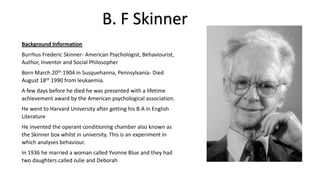
B.F. Skinner by Kimone, Chloe & Danielle
- 1. B. F Skinner Background Information Burrhus Frederic Skinner- American Psychologist, Behaviourist, Author, Inventor and Social Philosopher Born March 20th 1904 in Susquehanna, Pennsylvania- Died August 18th 1990 from leukaemia. A few days before he died he was presented with a lifetime achievement award by the American psychological association. He went to Harvard University after getting his B.A in English Literature He invented the operant conditioning chamber also known as the Skinner box whilst in university. This is an experiment in which analyses behaviour. In 1936 he married a woman called Yvonne Blue and they had two daughters called Julie and Deborah
- 2. Theory • B.F. Skinner believed that behaviour is extremely nurture; as all behaviour can be learnt and shaped by punishment and rewards. Therefore, behaviour is reinforced by consequences and sequences of event which reinforced the idea that human‟s free will is only an illusion to society and that human action are results of consequences. Skinner uses an operant conditioning chamber also known as the Skinner box to test his theory.
- 3. Skinner Box Experiment • Skinner showed how positive reinforcement worked by placing a hungry rat in the „Skinner box‟. The box contained a lever in the side and as the rat moved about the box it would accidentally knock the lever. Immediately as the rat knocked the lever a food pellet would drop into a container next to the lever. The rats quickly learned to go straight to the lever after a few times of being put in the box. The consequence of receiving food if they pressed the lever ensured that they would repeat the action again and again.
- 4. Operant Conditioning • B.F Skinner believed that the best way to understand behaviour was to look at the causes of an action and its consequences. Skinner called this approach operant conditioning. • The theory of operant conditioning was based on the work of Thorndike(1905). The theory known as the „Law Of Effect‟ was created by Edward Thorndike. Edward Thorndike studied learning in animals using a puzzle box which is the theory „Law Of Effect‟. • Skinner is regarded as the father of Operant Conditioning, however his work was based on Thorndike‟s law of effect. • A new term was introduced into the law of effect by Skinner. The new term was called reinforcement. • Behaviour that is reinforced usually is repeated meaning it is strengthen but behaviour which is not reinforced tends to die out meaning it is weakened. • Skinner (1948) studied operant conditioning by conducting experiments using animals which he placed in a “Skinner Box”.